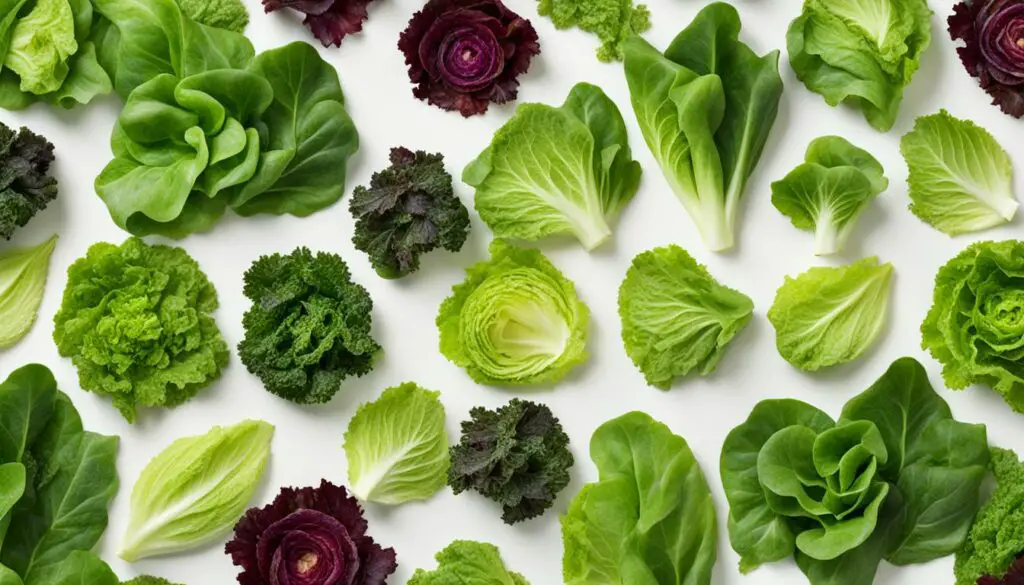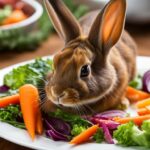As a responsible pet parent, I understand the importance of providing my rabbits with a healthy and balanced diet. One question that often comes up is whether rabbits can eat lettuce. In this guide, I will take you through everything you need to know about feeding rabbits, including the best food options, the benefits and risks of romaine lettuce, and special dietary considerations for rabbits at different life stages.
Key Takeaways:
- Rabbits can eat lettuce, but it should be fed in moderation.
- Hay should make up the majority of a rabbit’s diet, as it provides essential fiber and aids in digestion.
- Leafy greens and safe vegetables can be given as daily servings to provide additional nutrients and variety.
- Treats should be limited and given sparingly to maintain a balanced diet.
- Consult with a veterinarian for personalized dietary recommendations for your rabbits.
A Healthy Diet for Rabbits: Hay, Leafy Greens, and Pellets
When it comes to keeping your rabbits healthy and happy, a balanced diet is of utmost importance. A proper rabbit diet consists of hay, leafy greens, and pellets, all of which provide essential nutrients for their overall well-being. Let’s take a closer look at each component:
The Importance of Hay
Hay should make up the majority of your rabbit’s diet. It’s rich in fiber, which aids in digestion and helps prevent gastrointestinal issues. Additionally, chewing on hay promotes good dental health as it naturally wears down their teeth. Providing unlimited access to fresh, quality hay is crucial for a rabbit’s optimal health.
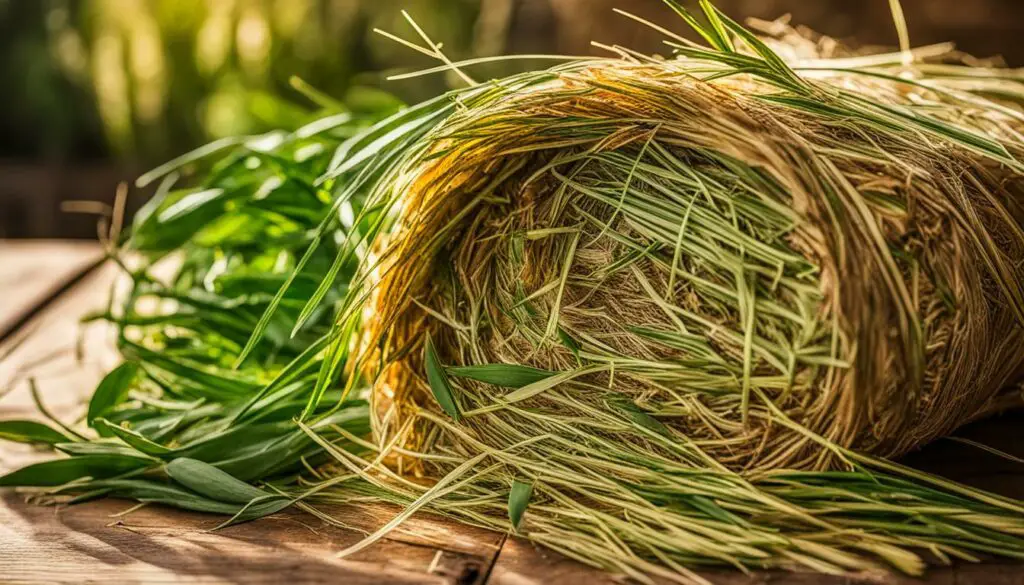
Leafy Greens for Daily Nutrition
Leafy greens should be included in your rabbit’s diet as a daily serving. These provide additional nutrients and variety to their meals. Safe options include lettuce, kale, parsley, and cilantro. Introduce new greens gradually to prevent digestive upset, and always wash them thoroughly before feeding.
Pellets in Moderation
Pellets can be given to rabbits, but they should be fed in smaller portions. Choose high-quality pellets that are specifically formulated for rabbits and avoid ones with added sugars or fillers. Pellets should make up a small portion of their diet, with the majority consisting of hay and leafy greens.
Incorporating hay, leafy greens, and pellets into your rabbit’s diet will ensure they receive the necessary nutrients for optimal health. Remember to provide clean drinking water at all times and consult with a veterinarian for specific dietary recommendations based on your rabbit’s individual needs.
The Importance of Hay in a Rabbit’s Diet
When it comes to a rabbit’s diet, one essential component that should never be overlooked is hay. Hay plays a vital role in a rabbit’s overall health and well-being, impacting both their digestion and dental health. It is a rich source of fiber, which aids in proper digestion and prevents gastrointestinal issues in rabbits.
Additionally, hay promotes good dental health for rabbits. As herbivores, rabbits’ teeth continuously grow throughout their lives. Chewing on hay helps naturally wear down their teeth, preventing overgrowth and potential dental problems. Therefore, offering unlimited access to hay is crucial in maintaining a rabbit’s dental hygiene and overall oral health.
By incorporating hay into a rabbit’s diet, you are providing them with the necessary fiber for healthy digestion and the opportunity to maintain proper dental health. These benefits contribute to the overall well-being and longevity of your furry friend.
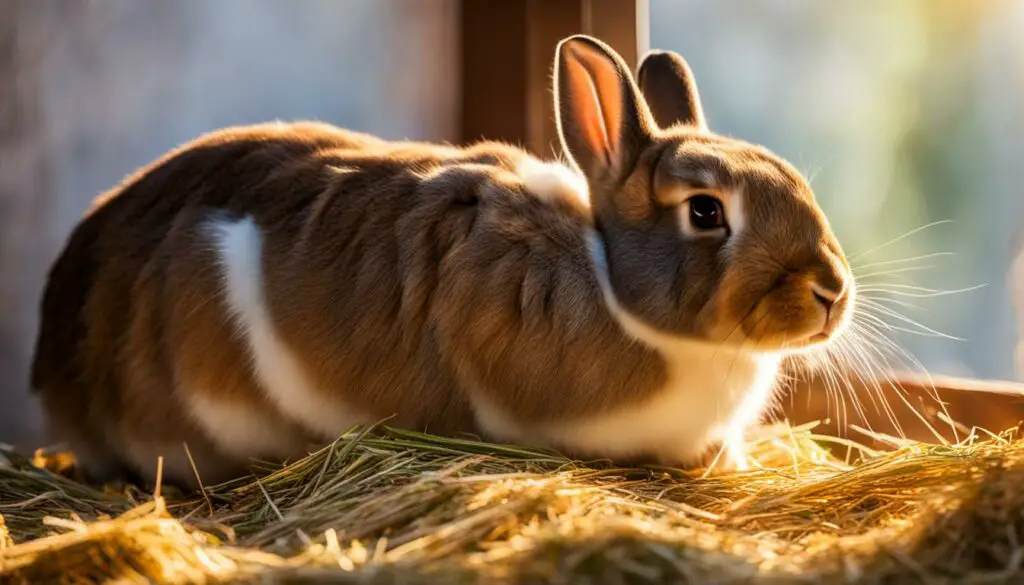
Hay Comparison Table
| Hay Type | Description | Benefits |
|---|---|---|
| Timothy Hay | A common and easily accessible type of hay. | High in fiber, promotes dental health, aids digestion. |
| Orchard Hay | Harvested from orchard grass, provides variety. | Rich in nutrients, stimulates appetite, prevents boredom. |
| Meadow Hay | A mix of various grasses and herbs. | Diverse range of nutrients, natural foraging experience. |
| Herbal Hay | Contains a blend of herbs for added flavor. | Enhances taste, provides sensory enrichment. |
“Hay is the cornerstone of a rabbit’s diet, ensuring their digestive system functions properly and their teeth remain healthy. Providing quality hay is like giving your rabbit the gift of optimal health.”
Rabbits have specific dietary needs, and hay is an essential part of meeting those needs. It is crucial to choose the right type of hay and offer it in unlimited quantities to ensure a balanced diet for your furry friend. Remember, providing hay not only supports their digestive and dental health but also promotes their overall well-being.
Choosing the Right Type of Hay for Your Rabbit
When it comes to feeding your rabbit, hay is an essential component of their diet. But did you know that not all hay is the same? Choosing the right type of hay for your furry friend is important to ensure they receive the proper nutrition and enjoy a healthy, balanced diet.
The most recommended type of hay for rabbits is Timothy hay. It is high in fiber and coarse, which promotes proper digestion and dental health. Timothy hay is readily available in most pet stores and is a staple in many rabbit owners’ homes. However, there are other options to consider as well.
Orchard hay, meadow hay, and herbal hay are also suitable choices for your rabbit’s diet. These types of hay can provide variety and additional nutrients to their meals. Including a mix of different hays can help prevent boredom and ensure your rabbit gets a well-rounded diet.
| Type of Hay | Nutritional Benefits |
|---|---|
| Timothy Hay | High in fiber, promotes digestion and dental health |
| Orchard Hay | Rich in nutrients, adds variety to the diet |
| Meadow Hay | Provides essential nutrients, helps with foraging instincts |
| Herbal Hay | Adds flavor and aroma, offers additional health benefits |
Choosing the right hay for your rabbit
When selecting hay for your rabbit, look for fresh and fragrant options. Avoid hay that appears dusty, moldy, or has a strong odor. It’s important to store hay in a cool, dry place to maintain its quality. Rabbits should have unlimited access to hay throughout the day to ensure they can graze and chew as they please.
Remember, hay is a crucial part of your rabbit’s diet, so it’s important to choose the right type and provide it in abundance. By offering a variety of hays and ensuring they are of good quality, you can help support your rabbit’s overall health and well-being.

Fresh Foods for Rabbits: Leafy Greens and Safe Vegetables
When it comes to providing a well-balanced diet for your rabbits, fresh foods play an important role. Leafy greens and safe vegetables are not only nutritious but also provide variety to their meals. Including these foods in their diet can help keep their taste buds satisfied and their overall health in check.
Leafy greens are an excellent source of vitamins and minerals for rabbits. They should make up about 10% of their daily food intake. Safe options include arugula, celery leaves, dandelion greens, and watercress. These greens provide not only essential nutrients but also hydration, as they have a high water content. It’s important to introduce new greens gradually to avoid any digestive issues.
When it comes to safe vegetables, rabbits can enjoy a variety of options. Carrots, broccoli, bell peppers, and zucchini are just a few examples. These vegetables are packed with vitamins and fiber, which are essential for maintaining good digestive health. It’s important to remember that vegetables should be given in moderation and as part of a balanced diet.
Incorporating fresh foods into your rabbits’ diet not only adds nutritional value but also provides mental stimulation. The different textures, flavors, and colors of these foods can keep your rabbits engaged and excited during mealtime. Remember to always wash and prepare fresh foods properly before feeding them to your furry friends.
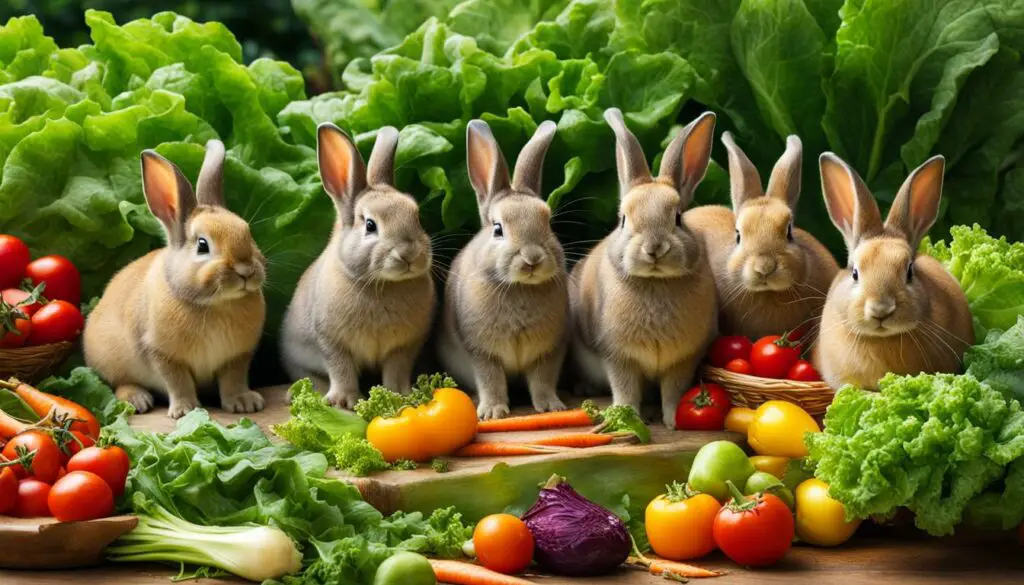
Table: Safe Leafy Greens and Vegetables for Rabbits
| Leafy Greens | Safe Vegetables |
|---|---|
| Arugula | Carrots |
| Celery leaves | Broccoli |
| Dandelion greens | Bell peppers |
| Watercress | Zucchini |
Herbs for Rabbits: Adding Flavor and Enrichment
Adding herbs to your rabbit’s diet can provide them with additional flavor and mental enrichment. Not only do herbs offer a variety of tastes and textures, but they also contain essential nutrients that can contribute to your rabbit’s overall health and well-being. However, it’s important to choose safe herbs that are suitable for rabbits. Here are some herbs that you can include in your rabbit’s diet:
- Basil: Basil is a flavorful herb that rabbits enjoy. It contains essential vitamins and minerals, including vitamin K, magnesium, and iron.
- Cilantro: Cilantro is another herb that rabbits find delicious. It is rich in antioxidants, vitamins A and C, and has anti-inflammatory properties.
- Mint: Mint is a refreshing herb that rabbits often find appealing. It can aid digestion and provide a cooling effect during hot weather.
- Parsley: Parsley is a nutritious herb that contains vitamin C, vitamin K, and potassium. It can be beneficial for your rabbit’s immune system and overall health.
- Thyme: Thyme is an aromatic herb that rabbits can enjoy in moderation. It has antiseptic properties and can support respiratory health.
When offering herbs to your rabbit, it’s important to introduce them gradually and monitor their reaction. Always wash the herbs thoroughly and remove any wilted or spoiled leaves. You can offer herbs as part of the leafy greens portion of your rabbit’s diet, or as an occasional treat. Remember to provide a varied and balanced diet for your rabbit, combining herbs with hay, leafy greens, and pellets, in consultation with a veterinarian.
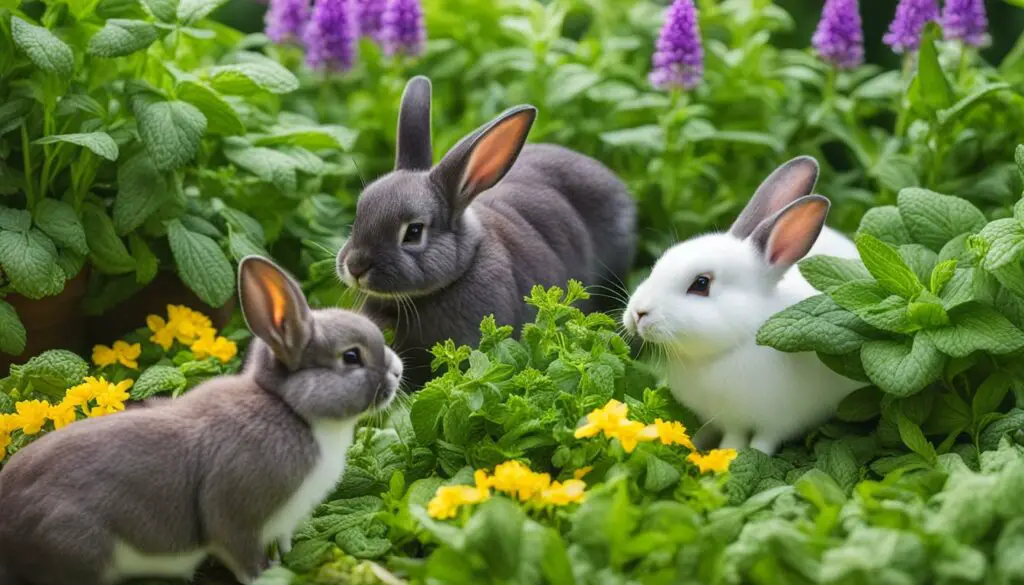
John Doe, Veterinarian, DVM
“Including herbs in a rabbit’s diet can provide both physical and mental stimulation. The aromatic and flavorful qualities of herbs can make mealtime more enjoyable for rabbits. However, it’s important to remember that herbs should be offered in moderation and as part of a well-balanced diet. Consulting with a veterinarian can help ensure that your rabbit’s dietary needs are being met.”
| Herb | Nutritional Benefits |
|---|---|
| Basil | Vitamin K, magnesium, iron |
| Cilantro | Antioxidants, vitamins A and C, anti-inflammatory properties |
| Mint | Digestive aid, refreshing, cooling effect |
| Parsley | Vitamin C, vitamin K, potassium |
| Thyme | Antiseptic properties, respiratory health support |
Treats for Rabbits: Fruits and Veggies in Moderation
Treats can be a fun way to bond with your rabbit and provide them with additional variety in their diet. However, it’s important to remember that treats should only make up a small portion of their overall food intake. Feeding rabbits too many treats can lead to weight gain and health issues.
When it comes to choosing treats for your rabbit, opt for fresh fruits and vegetables that are safe for their consumption. Some fruits that are safe for rabbits include apples, bananas, and berries. Vegetables such as carrots, green beans, and bell peppers are also good options. Remember to wash all fruits and vegetables thoroughly before feeding them to your rabbit.
It’s important to feed treats in moderation. A general guideline is to offer 1-2 tablespoons of treats per day. This ensures that your rabbit is still getting the majority of their nutrition from their regular diet of hay, leafy greens, and pellets. If you’re unsure about which treats are safe for your rabbit or how much to feed them, consult with your veterinarian for personalized recommendations.
| Treats for Rabbits | Quantity |
|---|---|
| Fresh Fruits | 1-2 tablespoons per day |
| Fresh Vegetables | 1-2 tablespoons per day |
Remember, treats should be given as a supplement to your rabbit’s balanced diet, not as a replacement for their main food sources. By providing treats in moderation and focusing on their regular diet, you can keep your rabbit healthy, happy, and eager for those special snack times.
Special Dietary Needs for Rabbits at Different Life Stages
As rabbits go through different life stages, their dietary needs may change. Proper nutrition is essential to support their growth, reproduction, and overall health. Let’s explore the specific dietary requirements for baby rabbits, pregnant rabbits, and elderly rabbits.
Diet for Baby Rabbits
During their early weeks of life, baby rabbits rely on their mother’s milk for all their nutritional needs. However, as they grow, they will start to nibble on solid foods. It’s important to introduce a balanced diet gradually, starting with high-quality hay and fresh water. Pellets specifically formulated for young rabbits can also be introduced.
Additionally, baby rabbits require higher levels of calcium and protein to support their rapid growth. Providing small amounts of fresh leafy greens, such as cilantro or dandelion greens, can help supplement their diet with essential nutrients.
Diet for Pregnant Rabbits
Pregnant rabbits have increased nutritional requirements to support both their own health and the growth of their babies. It’s important to provide a diet that is rich in fiber, protein, and calcium. High-quality hay should make up the majority of their diet, while pellets specifically formulated for pregnant rabbits can be given in smaller amounts.
Additionally, pregnant rabbits can benefit from a variety of fresh leafy greens and safe vegetables, such as kale, spinach, or carrot tops. These provide essential nutrients and help maintain a balanced diet. Consult with a veterinarian for specific dietary recommendations based on your rabbit’s individual needs.
Diet for Elderly Rabbits
As rabbits age, their metabolism and digestive system change, which can affect their dietary needs. Older rabbits may have a decreased appetite or difficulty digesting certain foods. It’s important to monitor their weight and adjust their diet accordingly.
Elderly rabbits may benefit from a diet that is lower in calories and higher in fiber. Providing unlimited amounts of high-quality hay and reducing the portion of pellets can help maintain their digestive health. Special care should be taken to ensure they have access to fresh water and a variety of fresh leafy greens to support their overall well-being.
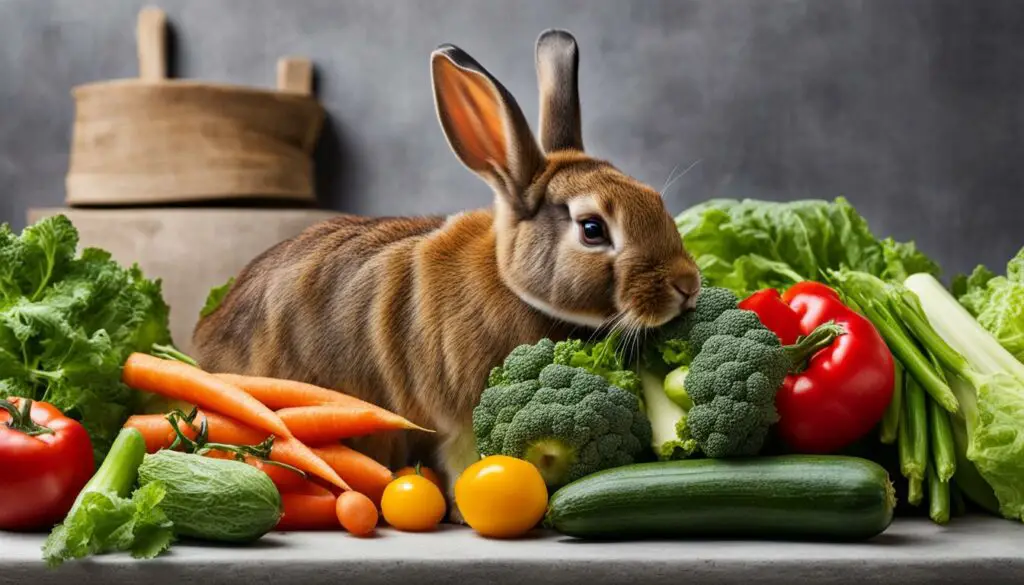
Can Rabbits Eat Romaine Lettuce? Benefits and Risks
Romaine lettuce is a popular salad green that is often included in human diets and pet foods. Many rabbit owners wonder if it is safe to feed romaine lettuce to their furry friends. The answer is yes, but with some important considerations. Let’s explore the benefits and risks of including romaine lettuce in a rabbit’s diet.
Benefits of Romaine Lettuce for Rabbits: Romaine lettuce is low in calories and high in water content, which can help keep rabbits hydrated. It also contains essential vitamins and minerals, such as vitamin C, vitamin K, potassium, and folate, which contribute to overall wellness. Additionally, the crunchy texture of romaine lettuce can provide enrichment and help wear down a rabbit’s teeth.
Risks of Romaine Lettuce for Rabbits: While romaine lettuce can be a healthy addition to a rabbit’s diet, it should be fed in moderation. Excessive consumption of romaine lettuce can lead to digestive problems, such as diarrhea or gastrointestinal blockages. It’s important to introduce new foods gradually and monitor your rabbit’s digestion when introducing romaine lettuce for the first time.
When feeding romaine lettuce to your rabbit, it’s crucial to follow proper portion control. As a general guideline, romaine lettuce should make up no more than 10% of a rabbit’s diet. This amounts to about one to two cups of romaine lettuce per day for an average-sized rabbit. Always consult with a veterinarian before introducing romaine lettuce or any new food to your rabbit’s diet to ensure it is suitable for your pet’s individual needs.
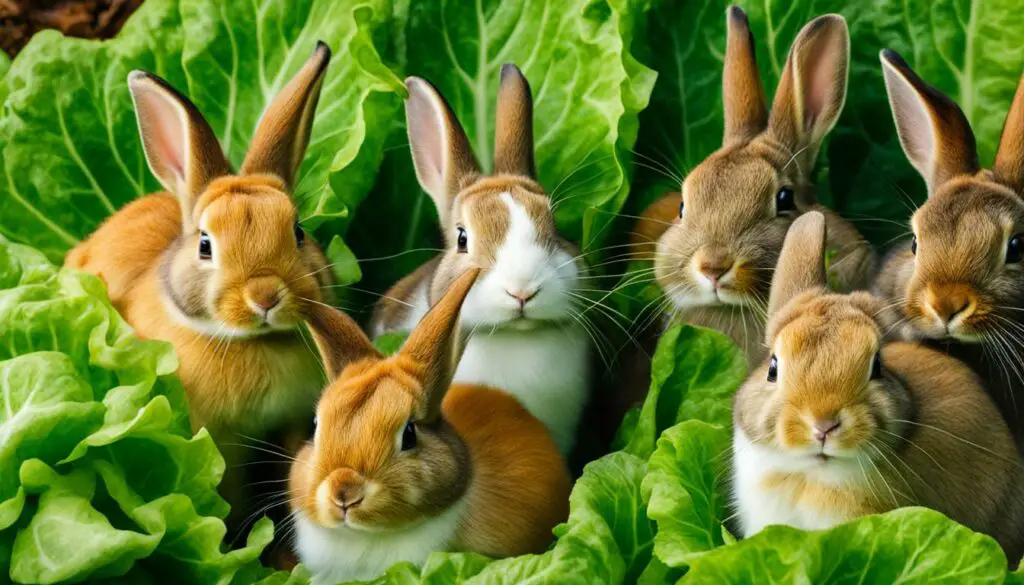
Table: Benefits and Risks of Romaine Lettuce for Rabbits
| Benefits | Risks |
|---|---|
| Low in calories | Potential digestive problems |
| High water content | Diarrhea |
| Contains essential vitamins and minerals | Gastrointestinal blockages |
| Provides enrichment and helps wear down teeth |
How Much Romaine Lettuce Can Rabbits Eat?
When it comes to feeding romaine lettuce to rabbits, moderation is key. While romaine lettuce can be included in a rabbit’s diet, it should only make up a small portion of their overall food intake. Generally, it is recommended that no more than 10% of a rabbit’s diet comes from romaine lettuce. This translates to about one to two cups of romaine lettuce per day for an average-sized rabbit. It’s important to introduce new foods gradually and consult with a veterinarian for specific dietary recommendations for your pet rabbits.
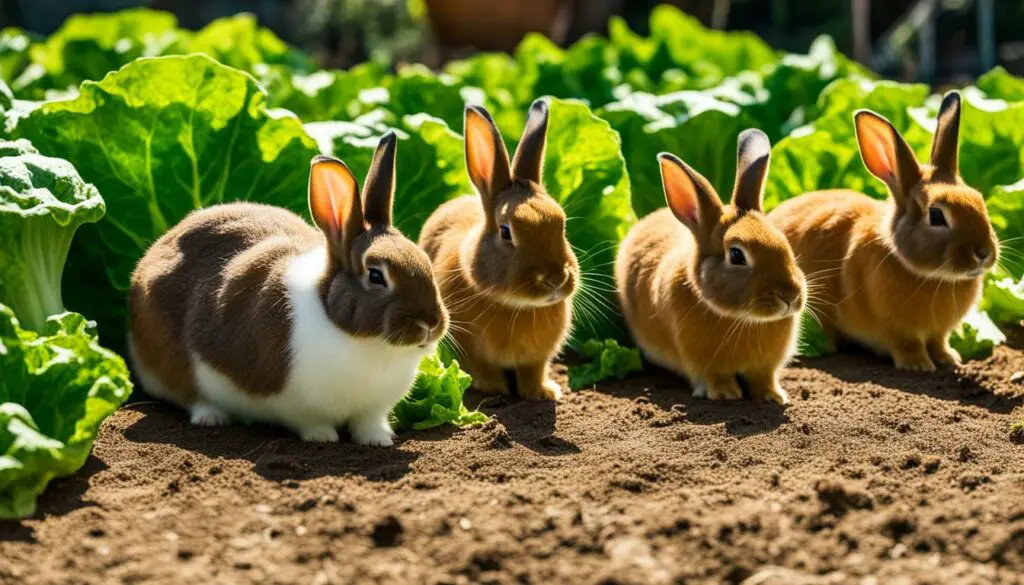
Romaine lettuce is a leafy green that can provide some nutritional benefits to rabbits. It is low in calories and high in water content, which can help with hydration. Additionally, romaine lettuce contains vitamins A and K, as well as some fiber. However, it’s important to remember that romaine lettuce should be given in moderation and as part of a balanced diet.
Feeding too much romaine lettuce to rabbits can lead to digestive problems and nutrient imbalances. Excessive consumption can cause diarrhea and upset stomachs. It’s important to monitor your rabbit’s reaction to romaine lettuce and adjust their diet accordingly. If you notice any digestive issues or changes in behavior, it’s best to consult with a veterinarian.
Summary
- Romaine lettuce should only make up a small portion of a rabbit’s diet, no more than 10%.
- Introduce romaine lettuce gradually and monitor your rabbit’s reaction.
- Feeding too much romaine lettuce can lead to digestive problems and nutrient imbalances.
- Consult with a veterinarian for personalized dietary recommendations for your pet rabbits.
Conclusion
In summary, a well-balanced diet is essential for maintaining the health and happiness of pet rabbits. Hay should be the primary component of their diet, providing necessary fiber for digestion and promoting proper dental health. Fresh leafy greens and safe vegetables can be included to provide additional nutrients and variety.
Treats should be given sparingly, with small portions of fresh fruits and vegetables serving as occasional rewards. It’s important to feed treats in moderation to maintain a balanced diet and prevent overfeeding.
When it comes to romaine lettuce, caution should be exercised. While it can be included in a rabbit’s diet in limited amounts, excessive consumption can lead to digestive issues and nutrient imbalances. It’s advisable to consult with a veterinarian before introducing romaine lettuce into a rabbit’s diet.
Remember, each rabbit has unique dietary needs, and it’s crucial to consult with a veterinarian for personalized recommendations based on your pet’s specific requirements. By providing a well-rounded and nutritious diet, you can ensure that your rabbits thrive and live a healthy, happy life.
FAQ
What should be the main component of a rabbit’s diet?
Hay should be the main component of a rabbit’s diet.
Why is hay important for rabbits?
Hay is important for rabbits because it aids in digestion, helps prevent gastrointestinal issues, and promotes good dental health.
What type of hay is recommended for rabbits?
Timothy hay is recommended for rabbits as it is high in fiber and promotes proper digestion and dental health.
Can rabbits eat fresh leafy greens?
Yes, rabbits can eat fresh leafy greens as they provide additional nutrients and variety in their diet.
What are safe options for leafy greens for rabbits?
Safe options for leafy greens for rabbits include arugula, celery leaves, dandelion greens, and watercress, among others.
Can rabbits eat herbs?
Yes, rabbits can eat herbs as they add flavor and mental enrichment to their diet.
What are safe options for herbs for rabbits?
Safe options for herbs for rabbits include basil, cilantro, mint, parsley, and thyme.
Can rabbits have treats?
Yes, rabbits can have treats, but they should be given sparingly and in moderation.
What are safe options for treats for rabbits?
Safe options for treats for rabbits include apples, bananas, carrots, green beans, and watermelon, among others.
Do rabbits have special dietary needs at different life stages?
Yes, different life stages of rabbits have specific dietary needs.
Can rabbits eat romaine lettuce?
Yes, rabbits can eat romaine lettuce, but it should be fed in limited amounts and with caution.
How much romaine lettuce can rabbits eat?
Generally, no more than 10% of a rabbit’s diet should come from romaine lettuce.

